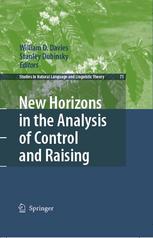

Most ebook files are in PDF format, so you can easily read them using various software such as Foxit Reader or directly on the Google Chrome browser.
Some ebook files are released by publishers in other formats such as .awz, .mobi, .epub, .fb2, etc. You may need to install specific software to read these formats on mobile/PC, such as Calibre.
Please read the tutorial at this link: https://ebookbell.com/faq
We offer FREE conversion to the popular formats you request; however, this may take some time. Therefore, right after payment, please email us, and we will try to provide the service as quickly as possible.
For some exceptional file formats or broken links (if any), please refrain from opening any disputes. Instead, email us first, and we will try to assist within a maximum of 6 hours.
EbookBell Team

0.0
0 reviewsRaising and control have figured in every comprehensive model of syntax for forty years. Recent renewed attention to them makes this collection a timely one. The contributions, representing some of the most exciting recent work, address many fundamental research questions. What beside the canonical constructions might be subject to raising or control analyses? What constructions traditionally treated as raising or control might not actually be so? What classes of control must be recognized? How do tense, agreement, or clausal completeness figure in their distribution? The chapters address these and other relevant issues, and bring new empirical data into focus.